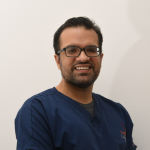Dentistry starts and ends with patients. Creating and building a successful business means tailoring services around your patient demographic.
This is something that Dr Nadim Majid knows very well, having set up his own private squat practice in 2008. Reflecting on his experience, Nadim discusses what he feels are the most important aspects to consider when starting a practice from scratch:
“It is essential to consider cashflow from the very beginning in order to make the business cash positive. You cannot expect to make profit from day one, but you do need to think about how you will grow your patient base and how income can be generated to offset running costs.”
Everything from equipment purchases to practice design and team recruitment need to be approached carefully when establishing a new practice. This is a vulnerable time for the business, so making the right decisions in these areas will have a significant impact on how quickly it grows in the short-term. Indeed, Nadim suggests his team was key to his success, commenting:
“It’s crucial to employ the right people and to establish trust among the team. This can be difficult when you’ve only been open a short time, but it is not impossible. I have always tried to do the very best I could for the people around me. I think it’s important to admit when mistakes are made, to be open and honest about the situation, and to show a genuine interest in finding mutually beneficial solutions. When you treat people with respect, honesty and integrity, they will return the same.
“Adequate training should also be provided to all team members to prepare them to greet and care for patients. For example, the receptionist needs to have enough knowledge about dental procedures to discuss options with patients and show before and after images from other cases. If you have a treatment coordinator, they will need sufficient knowledge to guide patients on what they’re looking for too. A lot of this is about telling the stories of previous patients to gain the trust of new people.”
All of this is important to build patient numbers and grow a dental business in any situation, but it is vital for a new practice. When setting-up, everything needs to be carefully designed with the patient in mind for efficient growth. Nadim continues:
“Once you have decided what type of treatment you want to provide as an individual and as a practice, you’ll need to consider how to attract the right type of patients. For example, if you wish to focus on restorative dentistry or dentures, you might need to appeal to an older patient demographic. You’ll need to identify what they will value and what concerns they may have, and then tailor services or the practice design accordingly. What kind of environment will they be expecting? How would they wish to be greeted? How, when and where you market the practice should tie into all of this and the team should be made aware too in order to create an effective patient journey.
“In terms of equipment, this should be tailored to your patients, as well as for the space available. A small feasibility study will also provide valuable insight into how the initial cost compares to the impact the technology will have on the business and, therefore, your return on investment.
“There also needs to be a business plan in place where you intend to focus services. Where we see patients that can’t tolerate or afford dental implants, or simply want an alternative solution, we have a partnership with other practices to refer to.”
Of course, some mistakes are inevitable when starting out as some trial and error is involved, so it’s important to minimise the risk of issues and to learn from experiences. Nadim shares some of the challenges he faced and how he would encourage others to avoid them:
“In the beginning, we did not use the correct marketing channels for the patients we were hoping to attract. We realised the importance of promoting the business in the right newspapers, magazine and websites according to where our target audience may look for dental care services. Learning to say no to some patients has also been part of our journey.”
Offering some final advice for colleagues, Nadim adds:
“Having mentors is important to maintain clinical development while taking on a project like a new practice. The ADI is very good at providing opportunities for education and continual progression. Many members will have also set up their own practices and can provide support in this too.”
One of the many educational benefits ADI members have access to is a range of webinars – one of which Nadim presents to discuss the above topics in more detail. To find out and discover the many other subjects explored by inspiring clinicians, join the ADI today!
For more information, or to join, pleases visit www.adi.org.uk









